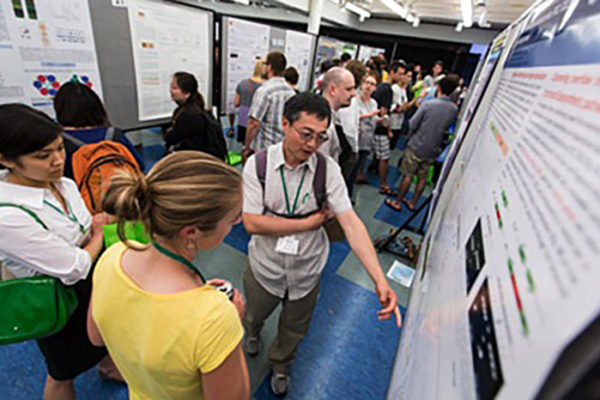New models of drug-resistant breast cancer hint at better treatments
Breast cancer that spreads to other organs is extremely difficult to treat. Doctors can buy patients time, but a cure remains elusive. Now, researchers at the School of Medicine have shown that human breast tumors transplanted into mice are excellent models of metastatic cancer and could be valuable tools in the search for better treatments. Shown are human breast cancer cells (red) growing amid mouse cells (green).
New Freund Fellowships announced
The Saint Louis Art Museum and the Sam Fox School of Design & Visual Arts at Washington University in St. Louis have announced that the Los Angeles-based artist Won Ju Lim and the Brooklyn-based artist Mariam Ghani will serve as Henry L. and Natalie E. Freund Teaching Fellows for the 2013-14 and 2014-15 academics year, respectively.
Students choose labs via scientific ‘speed dating’
Faculty members manned posters highlighting their research at a recent Division of Biology and Biomedical Sciences event geared toward helping graduate students meet faculty and learn about research before signing up for laboratory rotations. The event is an engaging step for students earning their PhDs or MD/PhDs through the Medical Scientist Training Program. Pictured is student Allyson Mayer visiting with Carlos Bernal-Mizrachi, MD, at the event.
Children’s Discovery Institute awards $2.4 million
As part of ongoing efforts to bolster pediatric research and lead to new discoveries, Children’s Discovery Institute plans to award more than $2.4 million to research initiatives at Washington University School of Medicine in St. Louis and St. Louis Children’s Hospital.
Trial to test prevention of Alzheimer’s has begun
Finding ways to diagnose and
treat Alzheimer’s disease has frustrated scientists and clinicians for decades. But now the battle has reached a potentially significant milestone: the launch of the first clinical trials to test whether giving new drug treatments before dementia can prevent Alzheimer’s. Shown are School of Medicine MDs and Alzheimer’s researchers Randall Bateman (left) and John C. Morris.
Middle East expert to discuss latest developments in Egypt
Samer S. Shehata, PhD, a leading Arab-American expert on Middle East politics, will deliver the keynote address at a public symposium titled “The Crisis in Egypt” at 4 p.m. Monday, Sept. 23, at Washington University in St. Louis. The symposium, which will be held in Umrath Lounge, will also feature a roundtable discussion and presentations on the latest developments in Egypt.
Medical startup hatched at Washington University continues strong performance
Andrew Brimer and Abigail Cohen, May graduates from the
School of Engineering & Applied Science at Washington University in
St. Louis and co-founders of the med-tech startup Sparo Labs, have won
the $150,000 CIMIT Student Technology Prize for Primary Care, bringing
their total competition winnings to more than $275,000.
My Name is Strong exhibit opens at Union Avenue Church
My Name Is Strong, a Clinton Global Initiative project, hosts an art exhibit Friday, Sept. 20 at Union Avenue Church. Some 45 works, including this piece(left) by Brown School student Kyle Brandt-Lubart, explore the issue of gender-based violence and celebrate the strength of its survivors.
Photo-palooza
More than 1,000 science researchers from around the world descended upon St.
Louis during the second week of August for what Provost Holden Thorp,
PhD, wittingly referred to as “Photo-palooza” for the gathering’s focus on photosynthesis research.
Washington University’s International Center for Advanced Renewable
Energy and Sustainability (I-CARES) served as host to the 11th Workshop
on Cyanobacteria and the Photosynthetic Antenna Research Center (PARC)
hosted the Light Harvesting Satellite Meeting 2013.
Two new NSF grants allow Bayly to study brain biomechanics
Philip Bayly, PhD, the Lilyan and E. Lisle Hughes Professor of Mechanical Engineering and chair the Department of Mechanical Engineering & Materials Science, has received a three-year, $429,222 grant from the National Science Foundation to study mehanical properties in the brain.
View More Stories

